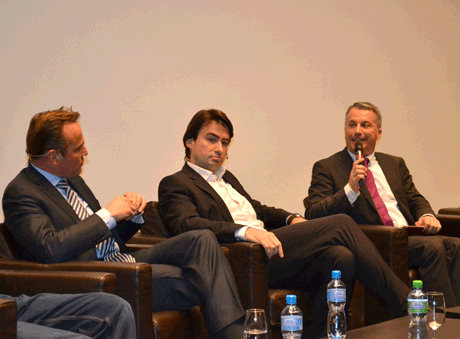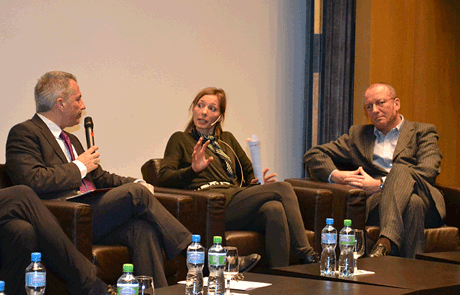Communication Summit: Public service in the online age
More than 400 communications professionals attended the Communication Summit 2012 at the ETH at the invitation of the Zurich Press Association ZPV and the Zurich Public Relations Society ZPRG. The focus was on public service in the digital age.
After a welcome by ETH Rector Heidi Wunderli-Allenspach and ZPV President David Strohm, SRG Director General Roger de Weck made a speech in the Introductory presentation to the benefits and services of the SRG. With regard to the online dispute between SRG and the publishers, he explained why online is becoming more important for the public service. Afterwards, de Weck joined AZ Medien CEO Christoph Bauer, journalist and blogger Michèle Binswanger, media lawyer and Swisscom chief legal officer Philip Kübler, and social media expert and PR entrepreneur Marcel Bernet in a panel discussion.
Why does SRG have to offer entertainment formats, asked SF presenter Reto Lipp ("Eco"), who led the discussion. Every broadcaster needs a mix of programming, de Weck justified himself. If you only broadcast public service programs, you wouldn't have any viewers. Kübler objected: In 25 years, the Internet will become the dominant medium, and watching a program at the same time will become less important. On the Internet, TV stations would no longer appear as entire channels, but rather there would be individual formats. Then the argument that the SRG must offer other programs in addition to the public service programs would no longer apply.
De Weck countered that the channel principle would continue for the next ten to 20 years. The idea of limiting the public service to the production of individual programs, which would be distributed on private channels, would not work. Such a model had existed in New Zealand. However, the private broadcasters had no interest in the programs, as their ratings went into the basement. Besides, everyone who runs a channel wants to program it himself with his own signature, de Weck said.
Solution to the online dispute in sight?
While the panelists agreed that new technical possibilities, social media and changing media consumption posed challenges for providers, the topic of public service was sometimes pushed into the background. Towards the end, moderator Lipp came to the Online dispute between SRG and publishers and demanded an assessment from Bauer and de Weck. The AZ boss announced that the publishers were worse off - precisely because of differing opinions within the association. He spoke of "very constructive talks," only to add immediately: "Whether a result will then emerge..." Since it is not yet known how media models and usage will develop, it is difficult to determine now what SRG will be allowed to do.
De Weck said it would come down to a compromise, with everything in favor of selective cooperation: SRG and the publishers would only have the critical mass on the advertising market together. He also believed that public service in the digital age also meant providing audiovisual production that small private companies could never afford. Finally, it would also be possible to reduce the costs of the technical infrastructure by working together. The advertising market is moving more and more to the Internet. If the SRG, which is co-financed by advertising, is never allowed to advertise there, it will only be financed by fees in ten to 15 years and will hardly be able to hold its own against global competition. (imp)










